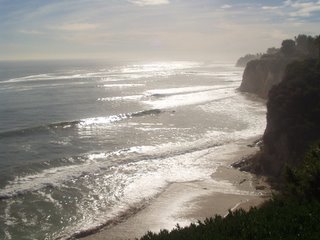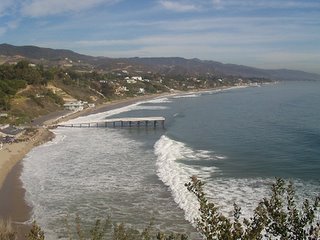Friday, December 23, 2005
Teaching the Twentieth Century at Brooklyn College
So I get to teach the fourth (and final) semester next Spring of Brooklyn Collegeís undergraduate theory sequence: Music 7.4, Twentieth Century Music. Now, good heavens, there are so many different kinds of music in the twentieth century Ė and so many fantastic composers Ė that a semester simply isnít enough to make sense of it all, and worthy subjects will inevitably be skipped. But hereís my plan.
I donít want to breeze blithely over every little thing; Iíd rather cover a few things in depth. So Iím centering all my lectures around the following pieces, all of which Iím comfortable with and all of which are important and/or exemplary in some way. (Note that, in order to pick up some necessary slack from Music 7.3, Iím starting in the nineteenth century. But, honestly, I canít wait to lecture on Tristan.)
Wagner, Tristan und Isolde
Debussy, Trois Nocturnes
Schoenberg, Five Pieces for Orchestra
Webern, Variations Op. 27
Stravinsky, Symphony in C
Lutoslawski, Symphony No.3
Reich, Music for Eighteen Musicians
Prof. Salvageís Favorite Pop Music Ė a TBA swirl of Beatles, Billy Joel, and others
To fill in the gaps, Iíve selected twenty (the approximate number of students in the class) topics each of which will be the subject for a twenty minute oral presentation by a student. These topics run the gamut from Ivesís Unanswered Question, to Cage, to Charlie Parker, to Richard Rogers. The term paper, 10-15 pages on a topic of their choice, must be on music that is not considered classical. Finally, there are four composition assignments (Iím supposed to assign a lot of formal composition) each requiring students to use some of the techniques Iíve illustrated in the lectures on the above pieces.
posted by David Salvage
11:41 PM
Wednesday, December 21, 2005
Happy Solstice

In the tradition of Jerry's much appreciated postcards from New York (my home town!), I thought I'd share with my S21 friends a couple of postcards from my home of the past 12 years, Malibu, to celebrate the winter solstice. These were taken about 23 minutes ago, a few yards up the bluff from where I spend my days and nights stringing notes together. The first photo is looking up the coast, northwest. We're having a significant surf event today: big swells with unusually large waves.

The second photo is of the view down the coast to the southeast as I pivot on my heels. On the far left by the pier, you'll see a restaurant on the sand (or what's left of it today). Any time you're in the L.A. area, join me for lunch and a muse-summoning stroll.
It would be great to see photos this week of other people's visual inspiration, whatever that may be to them. As composers, we spend so much time listening, but our other senses are equally heightened. I wish I could share the roaring sound and the salty/kelpy smell of this with everyone.
Peace on earth. And peace to our muses.
posted by Alex Shapiro
1:13 PM
Tuesday, December 20, 2005
A Gnarly Composer Speaks to His Audience
Towards the end (as of the evening of 12/19, anyway) of the hypertrophied comment thread a couple entries below here, Jerry Bowles contributed the following:
Let me try again. Because I am not a composer or a musician, I react to music viserally. It doesn't have to be sappy but it needs to touch me in some sensual way. Gnarly music seems to be asking me something but I usually don't understand the question--certainly not in the sophisticated, inhabited way that most of you folks do. But, like many consumers of music, I do know what I like. ... I mention all this because I think I am more or less typical of the audience most of you are trying to reach. I'm not suggesting that you change your style so us civilians will like it but you should be aware of what turns on our lights.
This is important, so I'd like to respond here - not on behalf of anyone other than myself, but I imagine that my attitudes about this issue are similar to those of other "gnarlyists."
Do I want you to enjoy my music? Absolutely.
Do I want you to care what I have to say, musically speaking? Absolutely.
I wouldn't write the music I write if I didn't feel it was somehow important, effective, and worth being heard. But what I want to be heard is this music - not another that may be more in line with the previous experiences of an unpredictably composed audience. I don't "want my music to be heard" in an abstract sense - I don't want to be famous; I'd settle for being respected by those whom I in turn respect. I simply put my work out there, to the degree possible, with the hope that others will discover in it what I find fascinating enough to devote my life to it.
In other words, I am speaking to the audience (and that itself is a very problematic concept for me, but that's another post) as equals - not as pupils, not as disciples, not as ignorant masses in need of enlightenment, but as fellow human beings with whom I want to share something that excites me. If it doesn't, then it's no so much that I have failed, nor that the audience has failed, nor that the music has failed, nor that the performer has failed, but that the fit wasn't right, and that is nobody's fault. It's an oft-repeated trope that what I am forced by circumstances to call "gnarly" music is hostile to the audience, or indifferent to it, or deprecatory; to me the truth is precisely the opposite. My attitude is not one of hostility or indifference but the greatest respect.
posted by Evan Johnson
8:19 PM
Monday, December 19, 2005
Making Music for Games
My girlfriend, whose gamer credentials far exceed my own, recently turned my attention to this article. Unfortunately, the author never really approaches an answer to its Cage-referencing opening paragraph. However, it does do a good job of summarizing the current state of music for video games, describing the challenges of writing for an interactive environment, and distinguishing video game music from film scoring. All in all, it seems to me like a fascinating medium in which a composer could have both an unprecedented amount of control and an unprecedented ability to relinquish that control. Since I havenít seen this topic broached here at Sequenza21, I thought Iíd offer it up with a few thoughts and questions.
First, has anybody had any experience working in the gaming realm? I know there were several students in the department at Columbia with me who were interested in scoring games, but Iíve never met a composer whoís actually worked on one.
Second, for other composers like me who grew up with video games, do you find that gaming has influenced your composing? Personally, though I mostly stick with live instrumentation, Iíve begun to wonder if my tendency toward audience interactivity and open forms isnít all because of Mario.
Third, how about audience interactivity in general - new direction or a dead end for new music?
posted by Lanier Sammons
2:36 PM
|




